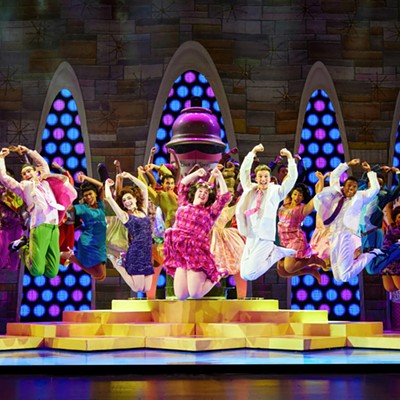Winding Road Theater Ensemble continues to impress with its dedication to produce at least one new play each season. It's always a bit of a gamble, but it's been one worth taking—at least for the audience.
This year, it's Sovereign Body by Emilie Beck—a uniquely conceived play, in form and in subject. The ensemble gives it a good go, and although it's not a totally successful effort, it packs enough punch to garner appreciation.
Perhaps most importantly, it gives a glimpse into what it's like to be besieged by a chronic, debilitating disease, not just by focusing on the physical effects, but also on how it messes with identity and feelings of self-worth. The play shows how disease challenges our illusion of control and demonstrates the limitations of science, art and spirituality to deal with that most universal of experiences, the mutiny of the body.
The setting is a rather typical American family gathering for Thanksgiving dinner at the home of Anna (Susan Arnold) and Tal (David Alexander Johnston). Anna's mother (Ellie Vought) is present as well as the couple's two young adult daughters (Lucille Petty and Melanie Kersey). Anna is a chef/owner of an upscale restaurant, and here she is overseeing the special meal's prep, but something's not right. She keeps dropping things, uncharacteristically, and seems unfocused, preoccupied. Perhaps the weirdest thing is that there is a well-dressed man (Tony Caprile) crowding her and her kitchen—a man only she seems to be aware of.
The preparation of the meal proceeds, with conversations revealing the personalities of the two girls and the entrance of Anna's brother (Gary Tyrrell) and his wife (Jill Baker), who are conservative and very Christian, unlike the other denizens of the house. Finally, husband Tal, a sculptor who has retreated to his studio, joins the group.
The opening act exists to establish a context for revealing Anna's disease, and how she will try to deal with life's sometimes awful surprises. Here the characters we meet seem more obviously representative of ways of grappling with life's pot shots than they are real people: science gives us the best chance at understanding life; no, art is the way that offers the greatest insights into our experience; no, no, religion is the way we can stand firm in the mighty winds of change and uncertainty.
Certainly a playwright uses characters as mouthpieces; that's the nature of the beast. However, it's also important that those mouthpieces feel like real people that an audience can embrace and care about.
The playwright also uses devices, which are intriguing, but prove difficult to pull off. First, there is the convention of the disease-as-character. The Man, as he is identified, is the one in the kitchen that no one sees except Anna. Actually, he has introduced the show, rising from a seat in the audience as the lights come up, making his way onto the stage, addressing the crowd cryptically and then hanging around as other characters appear. It's not clear who he is or what he's about, even as he interacts with Anna quite violently from time to time. It's actually a rather nifty idea, having Anna's "disease" invade her kitchen, knocking things out of her hands and even simulating raping her. Eventually we get it. Initially, though, it's more of a puzzling annoyance.
Another device that puzzles is the projection of a film clip, which shows Anna in a wedding dress running through the desert, being chased by The Man. Again, the flip-flop from the real to the surreal doesn't quite work. It's another interesting idea, but difficult to integrate smoothly. Ultimately, the first act feels cluttered, and it's hard to buy into this world.
In the second act we see both Anna's deterioration and how it has affected her family. Even here, the playwright throws in a new convention, allowing some of the characters to address the audience instead of developing ideas and concepts through characters conversing in a scene.
This is not to say that these devices cannot or should not exist in the same play. Particularly in this play, where Anna is devolving into the altered state of illness, some of these devices, which break with the conventional world, can be useful. But they are very difficult for a director—here it's Katherine Monberg—and actors to pull off smoothly and effectively.
What is effective is Arnold's performance as Anna. The disease is never named, but it is visibly a neurological disorder that affects almost everything from speech to balance to the ability to carry out the simplest of tasks. Anna, the Type-A, in-charge superwoman is stripped of her considerable powers and forced into a painful reckoning with dependence. Arnold's constrained and ill-functioning embodiment of one transformed by illness show her fear of losing who she is and has worked hard to become. Her colossal effort to distinguish her self from her disease is evident. The scene in which Anna, in halting speech with a flat affect, talks with daughter Callie on the phone, comforting her because she has lost her first love and assuring her she will love again, is quite touching, as she is reminded that she is still a mother and is needed.
Sovereign Body is a rich but difficult play, presenting numerous challenges. Although Winding Road's efforts are not totally successful, they do allow a glimpse into the painful process of reconciling who we think we are with who we become when our bodies fail us.








